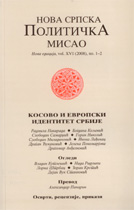| NSPM in English | |||
Et Tu, Joe |
 |
 |
 |
| среда, 27. мај 2009. | |
|
(The National Interest, 22.05.2009)
“an opportunity for the United States and the Russian Federation to deepen engagement on reducing nuclear weapons, cooperating on non-proliferation, exploring ways to cooperate on missile defense, addressing mutual threats and security challenges, and expanding the ties between American and Russian society and business.” It seems like an ambitious agenda. But the president may be better advised to start small—and he better make sure that his cabinet supports his engagement of Russia. Robert Draper’s recent exposé of former Defense Secretary Donald Rumsfeld noted: “Rumsfeld’s office cut against Bush’s pledge of cooperation and transparency with Russia on “a whole host of things,” says this official: the proposed Russian-American Observation Satellite, the Joint Data Exchange Center, plutonium disposition. By 2005 the Bush-Putin partnership had soured for a variety of reasons, including Russia’s growing economic swagger and America’s Iraq-induced decline in global prestige. But, the official observes, Rumsfeld “did not help the relationship; that’s clear.” Russia came to believe that the U.S. wasn’t interested in cooperating, and Rumsfeld’s actions “devalued what the president had originally said. It made the Russians believe he lacked credibility.” This illustrates a sad truth about U.S-Russia relations: it is far easier to obstruct than to move forward. With significant obstacles already in his path, the president is unlikely to generate a genuine “reset” of the relationship. Right now, Moscow and Washington are set in a series of opposing policies where deadlock can only be resolved by one side backing down. There is no longer any “middle ground” on missile defense or NATO expansion, for instance. Some pundits are still holding out the prospect of long-term Russian collapse as a reason not to make any compromises in the short run. But while Russia has been battered by the global financial crisis, it is not anywhere near a crisis situation, where the Kremlin would barter Russian acquiescence to U.S. policy goals in return for meaningful U.S. economic assistance. Moscow’s confidence is also on the rise given recent new economic agreements with Asian states and the signing of documents that put the South Stream pipeline project far ahead of Nabucco, its U.S.-backed rival. Obama may end up having a personal connection with Medvedev, but that is not going to translate into policy change. What would be useful between now and July would be for his administration to begin to assess what Washington really wants from Russia—and what the United States is prepared to live with. Because there is little support in Congress for such a reassessment, however, the president goes to Moscow with one hand tied behind his back. He cannot offer many incentives without being able to guarantee that his initiatives will be passed. Indeed, the vice president, back when he was a senator in 2008, made it clear that things like a “123” civil-nuclear agreement between the United States and Russia—similar to the one America signed with India during the Bush administration—could never happen unless Russia changed its political course. But Moscow shows no signs of changing its trajectory, and congressional attitudes remain unchanged. Moreover, with Biden the second-most important man in America, these attitudes have been “imported” into the White House itself. Optimists may argue that the president has a month and a half to begin laying the groundwork for a changed relationship. I am prepared to be pleasantly surprised—but I hold out no great expectations for a major shift. (Nikolas K. Gvosdev, a senior editor at The National Interest, is a professor of national-security studies at the U.S. Naval War College. The views expressed are entirely his own) |
Остали чланци у рубрици
- Playing With Fire in Ukraine
- Kosovo as a res extra commercium and the alchemy of colonization
- The Balkans XX years after NATO aggression: the case of the Republic of Srpska – past, present and future
- Из архиве - Remarks Before the Foreign Affairs Committee of the European Parliament
- Dysfunction in the Balkans - Can the Post-Yugoslav Settlement Survive?
- Serbia’s latest would-be savior is a modernizer, a strongman - or both
- Why the Ukraine Crisis Is the West’s Fault
- The Ghosts of World War I Circle over Ukraine
- Nato's action plan in Ukraine is right out of Dr Strangelove
- Why Yanukovych Said No to Europe

.jpg)








 President Barack Obama is scheduled to visit Russia in early July. White House Press Secretary Robert Gibbs says that the meeting between Obama and his Russian counterpart Dmitri Medvedev is intended to provide
President Barack Obama is scheduled to visit Russia in early July. White House Press Secretary Robert Gibbs says that the meeting between Obama and his Russian counterpart Dmitri Medvedev is intended to provide












